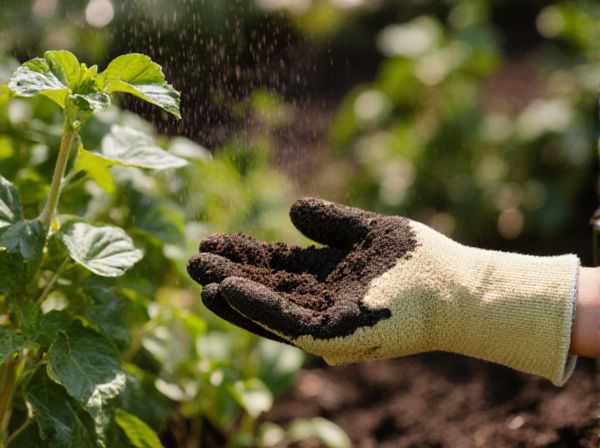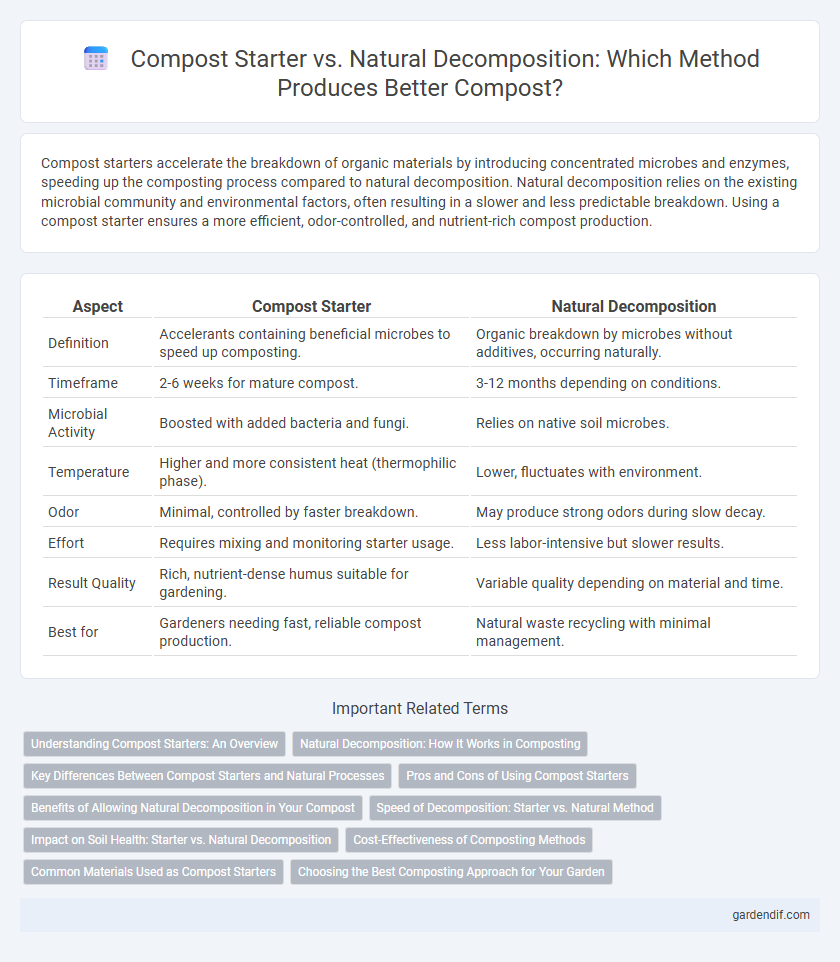
Compost Starter vs Natural Decomposition Illustration
Compost starters accelerate the breakdown of organic materials by introducing concentrated microbes and enzymes, speeding up the composting process compared to natural decomposition. Natural decomposition relies on the existing microbial community and environmental factors, often resulting in a slower and less predictable breakdown. Using a compost starter ensures a more efficient, odor-controlled, and nutrient-rich compost production.
Table of Comparison
| Aspect | Compost Starter | Natural Decomposition |
|---|---|---|
| Definition | Accelerants containing beneficial microbes to speed up composting. | Organic breakdown by microbes without additives, occurring naturally. |
| Timeframe | 2-6 weeks for mature compost. | 3-12 months depending on conditions. |
| Microbial Activity | Boosted with added bacteria and fungi. | Relies on native soil microbes. |
| Temperature | Higher and more consistent heat (thermophilic phase). | Lower, fluctuates with environment. |
| Odor | Minimal, controlled by faster breakdown. | May produce strong odors during slow decay. |
| Effort | Requires mixing and monitoring starter usage. | Less labor-intensive but slower results. |
| Result Quality | Rich, nutrient-dense humus suitable for gardening. | Variable quality depending on material and time. |
| Best for | Gardeners needing fast, reliable compost production. | Natural waste recycling with minimal management. |
Understanding Compost Starters: An Overview
Compost starters accelerate the breakdown of organic materials by introducing concentrated microbes, enzymes, and nutrients that enhance microbial activity and speed up decomposition. Natural decomposition relies solely on indigenous microorganisms and environmental conditions, often resulting in slower compost formation and less predictable outcomes. Utilizing a compost starter can significantly reduce composting time and improve the nutrient profile of the finished compost.
Natural Decomposition: How It Works in Composting
Natural decomposition in composting relies on microorganisms such as bacteria, fungi, and actinomycetes to break down organic matter into nutrient-rich humus. This process involves aerobic conditions where oxygen facilitates the enzymatic breakdown of carbon and nitrogen compounds, releasing essential nutrients for soil health. Temperature, moisture, and aeration critically influence the speed and efficiency of natural decomposition, impacting the quality of the finished compost.
Key Differences Between Compost Starters and Natural Processes
Compost starters accelerate the breakdown of organic materials by introducing concentrated microorganisms and nutrients, resulting in faster compost production compared to natural decomposition. Natural decomposition relies on ambient microorganisms and environmental conditions, making it slower and less predictable in nutrient balance and temperature control. Key differences include speed, microbial activity concentration, and the ability to jump-start decomposition in less-than-ideal conditions.
Pros and Cons of Using Compost Starters
Compost starters accelerate organic matter breakdown by introducing concentrated microbes, reducing decomposition time from months to weeks, which boosts nutrient availability for plants. However, compost starters can be costly and may disrupt natural microbial balance, potentially leading to less diverse compost ecosystems compared to natural decomposition. Natural decomposition, while slower and less predictable, supports a wider range of microbes and is more cost-effective, making it ideal for sustainable gardening practices.
Benefits of Allowing Natural Decomposition in Your Compost
Allowing natural decomposition in your compost promotes a balanced microbial ecosystem that enhances nutrient recycling and soil health. This process supports the slow breakdown of organic matter, resulting in richer humus that improves water retention and aeration in garden soil. Relying on natural decomposition reduces dependency on external additives, making it an eco-friendly and cost-effective composting method.
Speed of Decomposition: Starter vs. Natural Method
Compost starters significantly accelerate the breakdown of organic material by introducing concentrated microbes, reducing decomposition time from several months to weeks compared to the natural method. Natural decomposition relies solely on ambient microbial activity, which is slower due to less concentrated populations and variable environmental conditions. Using a compost starter optimizes temperature and microbial balance, speeding up the transformation into nutrient-rich humus.
Impact on Soil Health: Starter vs. Natural Decomposition
Compost starters accelerate microbial activity, rapidly enriching soil with essential nutrients like nitrogen, phosphorus, and potassium, thereby enhancing soil fertility and structure more efficiently than natural decomposition. Natural decomposition relies on ambient microbial populations and environmental conditions, resulting in slower nutrient release but promoting diverse microbial ecosystems over time. The immediate nutrient boost from compost starters supports vigorous plant growth, while natural decomposition fosters long-term soil resilience and organic matter accumulation.
Cost-Effectiveness of Composting Methods
Using a compost starter accelerates the decomposition process, reducing the time needed to produce nutrient-rich compost and potentially lowering labor and opportunity costs. Natural decomposition relies solely on micro-organisms present in organic waste, which can be slower and less predictable, leading to extended waste accumulation and delayed soil enrichment. For large-scale or time-sensitive gardening, compost starters offer a cost-effective advantage by optimizing resource use and improving compost quality in a shorter period.
Common Materials Used as Compost Starters
Compost starters often include materials like manure, blood meal, fish meal, and alfalfa meal, which provide essential nitrogen to accelerate microbial activity. Natural decomposition relies on the existing organic matter such as kitchen scraps, leaves, and yard waste but may decompose slower without added nitrogen sources. Incorporating effective compost starters balances the carbon-to-nitrogen ratio, promoting faster and more efficient breakdown compared to relying solely on natural decomposition.
Choosing the Best Composting Approach for Your Garden
Choosing between a compost starter and natural decomposition depends on your garden's needs and timeline. Compost starters accelerate microbial activity, quickly breaking down organic materials into nutrient-rich soil amendments, which is ideal for gardeners seeking fast results. Natural decomposition relies on local microorganisms, requires no additional products, and is cost-effective, but may take longer to produce usable compost.
Compost Starter vs Natural Decomposition Infographic

 gardendif.com
gardendif.com